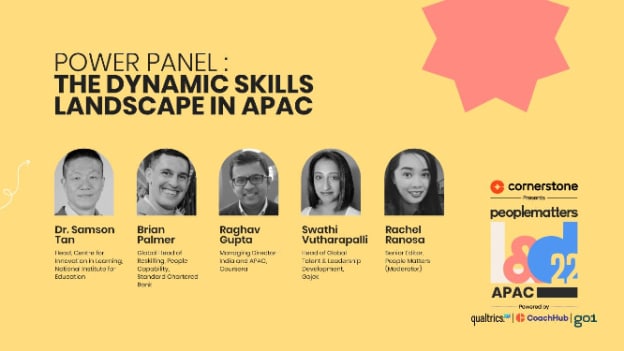The dynamic skills landscape in APAC

Many businesses are still grappling with a pre-pandemic workforce issue that has only been worsened by the coronavirus outbreak. With the world shifting to a digital economy, leaders continue to confront the question of how to future proof their workforce – the challenge of preparing our people to perform the jobs that are emerging today. To stay ahead of the curve, businesses must commit to upskilling their staff and bridging the digital skills gap, concurs a panel of experts in a session at People Matters L&D APAC Conference 2022.
Region-specific demand for skills
Companies and employees alike have learned over the last two years that people in a number of professions may work from anywhere. Working from home levels the playing field; it doesn't matter where you are. When it comes to skilling, do various regions have distinct skilling requirements? Leaders in international organisations are embracing diversity and inclusion to broaden their teams' talents and perspectives on the challenge at hand. For Standard Chartered Bank, the majority of skills training is global in nature. “We do differentiate based on business or function rather than geographic area,” says Brian Palmer, Global Head of Reskilling, People Capability, Standard Chartered Bank. “With the rising usage of digital channels, we are pivoting to agile working. The same sets of abilities are developed throughout all regions, including AMD, Europe, the Americas, and Asia,” Brian adds. A good portion of their upskilling and rescaling agendas have successfully delivered both role-based and skills-based journeys across multiple regions and with little market customization. So largely, “our goals remain twofold,” adds Brian – “improving business competence, and elevating our employee value proposition”. This will undoubtedly necessitate a combination of global and regional skills.
“In comparison to what we've seen in the United States, the trends we're witnessing in Asia maybe a little bit different,” says Swathi V., Head of Global Talent & Leadership Development, Gojek. With the growing focus on inclusion and belonging, it’s important to look at how resilient people are and how they can add value to work. “It’s a new angle to hiring,” adds Swathi. There was a greater emphasis on functional skill sets and the ability to perform the job. Today, there is a greater requirement from individuals or managers to create a new workspace, so you'll see all of these qualities as part of the hiring activities rather than just focusing on talents. “Growth mindset, for instance, is a focus area for us,” Swathi adds.
Balancing soft skills and hard skills
Maintaining a precise balance between hard and soft skills of their employees that would benefit both the firm and the individual is difficult for HR, particularly the learning and development team. Hard skills are what we look for when we hire. However, soft skills are equally critical. People's ability to engage and communicate with others, as well as their ability to act ethically and take responsibility for their actions, is where they usually fail.
"While the pandemic heightened tech innovations and the need for technical skills, it equally underlined the need for human skills. “The essential skills of the future is a combination of digital and human,” says Raghav Gupta, Managing Director - India and APAC at Coursera. If we've seen this in the previous two to three years, what may the future look like? According to the World Economic Forum's Future of Jobs Report, 50% of all employees will require reskilling by 2025 as technology adoption increases. Employers believe critical. thinking, problem-solving, and active learning will become more important in the next five years, Raghav adds.
“When we launched our rescaling upskilling initiatives,” adds Brian, “one of the aspects that we did want to incorporate was gamification.” “One area that we explored is developing brain training games with one of our vendors, and we have created about 50 brain training games as part of the gamified learning experience. There are some that focus on technical skills, but there's a lot that focuses on those soft skills and it allows them to practice 15 minutes a day so can learn things on a daily basis,” adds Brian.
Identifying right skill sets for your workforce
“Emerging technologies making inroads into the workplace are impacting skillsets for several organisations making it imperative for leaders to review existing skill sets,” says Samson Tan, Head, Centre for Innovation in Learning, National Institute for International Education (NIIED).
Having said that, it's difficult to predict the future. But you can help prepare for what can happen. To begin with, take a look at the information you already have. “You can use data from a variety of internal sources,” says Swathi, “to gain a deeper understanding of your own employees”. It's critical to understand the directions of the company for the next six months and plan your skilling programs as per the need. It’s important to be agile and future-ready and this is what the pandemic has taught us. You might need new tools and technologies to achieve the goal. Asking people about their career plans always helps to devise new skilling programs and this should happen frequently, Swathi adds.
















